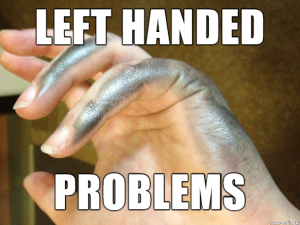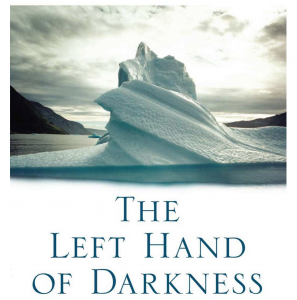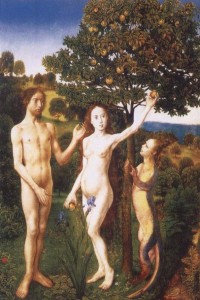In the introduction to her book, The Left Hand of Darkness, Ursula K Le Guin states that what authors are “trying to do is tell you what they’re like, what you’re like-what’s going on-what the weather is now” etc., and the main thing Le Guin seems to be telling us in this story is how screwed up gender roles are. Admittedly, as this book was written in the 60s, we can recognize that this has changed at least somewhat. But when hearing Genly Ai describe what a woman is like to Estraven by saying “the heaviest single factor in one’s life, is whether one’s born male or female…it determines one’s expectations, activities, outlook, ethics manners” he furthermore states that women ”don’t often seem to turn up mathematicians, or composers of music, or inventors, or abstract thinkers” (p. 253). We still live in a world where much fewer women go into certain fields then men, the sciences and the military particularly come to mind, and it’s hard not to wonder whether humans will ever really evolve past our heteronormative society.
“The Left Hand of Darkness”-Breaking or Reinforcing Gender Roles?
Ursula K. Le Guin has created an interesting society in her book, “The Left Hand of Darkness” by trying to escape gender roles, or so it appears. On the planet Winter, the inhabitants are androgynous unless during the mating cycle called kemmering. In designing a world where the people have no gender, one would think Guin would have successfully created a utopia (at least for a women’s studies minor) since the gender binaries would be destroyed. Surprisingly, though, Guin or at least her narrator, Genly Ai, fails at escaping gender stereotypes.
The most obvious example of this is the usage of the pronoun he throughout the novel. The English language lacks a neutral pronoun, creating a problem for individuals who are transgender or prefer not to be labeled by he/she. In “The Left Hand of Darkness,” the characters, except Genly, are genderless but are only ever referred to in male pronouns. Guin could be doing this for several reasons. The most straightforward one being the lack of a neutral pronoun thus, Guin using the default, he. If this is the case, then this is a topic right up a post-structural feminist’s alley. Another reason could be due to Guin writing in Genly’s voice and since Genly is a male from Earth his default pronoun would mostly be he.
The latter reason seems the most probable due to several reasons. First of all, it would be unreasonable that Guin, who has created a genderless society, would then go and accidentally introduce gender binaries. I was once told that an author never writes anything (a word, sentence, scene, etc.) without a reason and I believe that to this day. Thus, Guin is making a statement by her or per say Genly’s choice of pronouns. Perhaps, Guin is using Genly as a vessel to point out the flaws of our society and the box we have put ourselves in by loving our binaries.
Genly also projects gender roles on other characters in the novel, giving more evidence to the usage of the pronoun he being due to Genly’s mindset regarding gender. In meeting new people on the planet Winter, Genly has a habit of referring to their physical and behavioral traits either in a masculine or feminine way. For example, on page 60, Genly refers to Goss as “graceful as a girl.” Again, is this because Genly is experiencing a society without gender and is in the habit of classifying things through a gendered lens or is Guin unknowingly reinforcing gender roles?
Genly, though, does show an interesting and more developed side of himself on pages 252 and 253 when explaining women to Estravan. When asked if women and men are different species, Genly struggles with the answer and finally replies with a no but explains that the difference between the two sexes is one of importance. He does describe women with common stereotypes but proceeds to say one of my favorite lines in the book — “It’s extremely hard to separate the innate differences from the learned ones.” This is a perfect line since it speaks truth to our society but also shows that even though Genly can appear to have a mindset built around gender binaries he is able to question the origin of these ideas.
One can never know Guin’s true intentions but one can speculate. At a glance, I believed Guin was accidentally reinforcing gender roles but with a deeper analysis it appears that Guin was reinforcing gender roles through Genly to illustrate the mindset we humans have regarding gender and how it limits us. Well, at least the feminist in me does.
Left Handed People Can’t Do Anything Right.
One aspect about the Left Hand of Darkness that I have not been able to shake is the name of the book itself. I know that we touched on this some in class, but it still bothers me.
What is it about the left hand that makes everything seem worse? The mistrust of left-handers seems to have stemmed from ancient sun worship. Since the sun moved from left to right, the worshipers related everything to the right as “good” and everything to the left as “bad”. 
There are also passages in the bible that are not in favor of the left hand. The most prominent one comes from Matthew 25: 31-34, 41:
“When the Son of man shall come in his glory, and all the holy angels with him, then shall he sit upon the throne of his glory; and before him shall be gathered all nations: and he shall separate them on from another, as a shepherd divided his sheep from the goats: an he shall set the sheep on his right hand, but the goats on the left. Then shall the King say unto them on his right hand, ‘Come, ye blessed of my Father, inherit the kingdom prepared for you from the foundation of the world.’… Then shall he say also unto them on the left hand, ‘Depart from me, ye cursed, into everlasting fire, prepared for the devil and his angels.”
Even pictures describing the fall of man in the Garden of Eden depict Eve reaching up to pick an apple with her left hand.
In summary, left-handed people seem to get the short end of the stick.
The Perfect Uselessness Of Knowing The Answer To The Wrong Question
 Recently, we read The Left Hand of Darkness by Ursula Le Guin, one concept that she touched on in this novel is the idea that knowing your future is useless because knowing your future can cause it to happen. This comes up in the chapters related to “foretelling”, the ceremony practiced by the Handdara. The story, in particular,r that I feel best illustrates this is the story of the kemmer pair between Lord Berosty and Herbor. In this story, Berosty asks “what day shall I die?”, only to be told, rather vaguely, that he will die on Odstreth (the nineteenth day of the month). This sends him into paranoia. In order to try and help him, his partner, Herbor, goes to ask “How long will [Berstoy] live?” only to be told “longer than Herbor of Geganner!”. This prophesy fulfils itself because Berosty kills his kemmer in anger over not getting the desired answer. Berosty is left in despair at what he has done and later commits suicide on Odstreth. The interesting part of this story is that if the original question had not been asked by Berosty then he would likely not have died so soon. This can also be said of Herbor. I think part of the point of this chapter is to illustrate that knowing the future does not help stop it and if anything, only aids it. In fact, the Handdara believe that ignorance should be prized and that “ignorance is the ground of thought…The only thing that makes life possible is permanent, intolerable uncertainty”. Knowing the future just stops us from living in the moment and in some cases stops us from realizing the many possibilities available to us. In The Left hand of Darkness, once Meshe becomes “the center of time”, he is plagued by his knowledge and weeps when he tells the poor man of Sheney of the future and past, which emphasizes how knowledge is more difficult to live with than ignorance.
Recently, we read The Left Hand of Darkness by Ursula Le Guin, one concept that she touched on in this novel is the idea that knowing your future is useless because knowing your future can cause it to happen. This comes up in the chapters related to “foretelling”, the ceremony practiced by the Handdara. The story, in particular,r that I feel best illustrates this is the story of the kemmer pair between Lord Berosty and Herbor. In this story, Berosty asks “what day shall I die?”, only to be told, rather vaguely, that he will die on Odstreth (the nineteenth day of the month). This sends him into paranoia. In order to try and help him, his partner, Herbor, goes to ask “How long will [Berstoy] live?” only to be told “longer than Herbor of Geganner!”. This prophesy fulfils itself because Berosty kills his kemmer in anger over not getting the desired answer. Berosty is left in despair at what he has done and later commits suicide on Odstreth. The interesting part of this story is that if the original question had not been asked by Berosty then he would likely not have died so soon. This can also be said of Herbor. I think part of the point of this chapter is to illustrate that knowing the future does not help stop it and if anything, only aids it. In fact, the Handdara believe that ignorance should be prized and that “ignorance is the ground of thought…The only thing that makes life possible is permanent, intolerable uncertainty”. Knowing the future just stops us from living in the moment and in some cases stops us from realizing the many possibilities available to us. In The Left hand of Darkness, once Meshe becomes “the center of time”, he is plagued by his knowledge and weeps when he tells the poor man of Sheney of the future and past, which emphasizes how knowledge is more difficult to live with than ignorance.
 Another science fiction novel I enjoyed that deals with the idea of knowing the future is The Time Traveler’s Wife by Audrey Niffenegger. In this novel, the protagonist, Henry, often knows what is going to happen to him when he travels into his own time line; he even has to watch his mother’s car crash a large number of times, unable to stop it from happening. Knowing his future does not help him change it and, in a lot of instances, the fact that he knows the future aids its fulfillment. He only meets his (future) wife, Claire, because he travels to her garden when she is young and then she seeks him out when she is older. This begs the question “where does the event start”? He first meets her when he is 28 and she is 20 because she has known him since she was six. She has been seeing him at various ages for most of the intervening time. It is also suggested that he only travels back to her when she was young because she is an important part of his life. Claire gets quite frustrated with the idea that her future has already been decided for her in some parts and feels that she has no choice. Knowing the future is both a blessing and a curse for Henry. Although knowing the future can sometimes save Henry a lot of trouble he still chooses to not tell his younger self much about future, so he can live like a normal person.
Another science fiction novel I enjoyed that deals with the idea of knowing the future is The Time Traveler’s Wife by Audrey Niffenegger. In this novel, the protagonist, Henry, often knows what is going to happen to him when he travels into his own time line; he even has to watch his mother’s car crash a large number of times, unable to stop it from happening. Knowing his future does not help him change it and, in a lot of instances, the fact that he knows the future aids its fulfillment. He only meets his (future) wife, Claire, because he travels to her garden when she is young and then she seeks him out when she is older. This begs the question “where does the event start”? He first meets her when he is 28 and she is 20 because she has known him since she was six. She has been seeing him at various ages for most of the intervening time. It is also suggested that he only travels back to her when she was young because she is an important part of his life. Claire gets quite frustrated with the idea that her future has already been decided for her in some parts and feels that she has no choice. Knowing the future is both a blessing and a curse for Henry. Although knowing the future can sometimes save Henry a lot of trouble he still chooses to not tell his younger self much about future, so he can live like a normal person.
Both of these novels discuss whether or not it is wise to look for knowledge of the future. Genly Ai does not understand why people who possess the ability to foresee would not want to use it, but the people of Gethen (in particular the Handdara) see the knowledge as a burden. Similarly, Claire constantly wants to know more about the future but Henry is hesitant to tell her or even to learn it for himself. The next novel, Kindred, also deals with time travel so I hope that this theme will be further explored.
The Left Hand of Darkness: It’s a Man’s World?
 The Left Hand of Darkness, by Ursula K. Le Guin, centers on Genly Ai, Genry as the locals call him, on the planet Gethen as an envoy sent from the Ekumen. A special characteristic of Gethen is their concept of gender – there is none. Every citizen is essentially androgynous, neither male nor female, but somehow both.
The Left Hand of Darkness, by Ursula K. Le Guin, centers on Genly Ai, Genry as the locals call him, on the planet Gethen as an envoy sent from the Ekumen. A special characteristic of Gethen is their concept of gender – there is none. Every citizen is essentially androgynous, neither male nor female, but somehow both.
This genderless society has seemed to make a mark on a majority of their society. There are no gender stereotypes, as there is no gender. The reader can see Genry try and apply the male-female stereotypes to the people he meets, but it never seems to stick. One can see this in the comment he makes at the beginning of chapter 5 on page 49,
“My landlady, a voluble man, arranged my journey into the East.”
One can see how he is blatantly calling the owner of where he was staying a “landlady,” essentially suggesting that he sees peoples’ jobs in terms of male v. female jobs. He also makes comments throughout the book on when someone is acting particularly male or female. For example, when Genry and Estroven are in their tent, on page 235, Genry comments on Estroven’s body shape,
“ . . . built more like a woman than a man, more fat than muscle . . .”
He is offended and uncomfortable by Estroven “ordering” him around on the ice when he physically looks female.
It is interesting that even after two years on this planet, he is still unable to assimilate to the genderless society of Gethen. This concept of the book reflects our own society’s ideas about gender and the role it plays in how we act, work, and live. In current society, one can see how some have a hard time accepting the concept of gender fluidity. If one thinks about it, gender is a product of society’s views of how one should act. Some don’t want to be judged based upon how one thinks they should, only on how they are as a person. As the investigators notes quote on page 101 about Gethen,
“One is respected and judged only as a human being. It is an appalling experience.”
